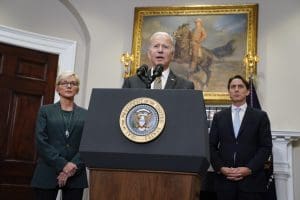Gas prices drop to 15-month low as Biden's fuel release leads to taxpayer windfall
Republicans criticized the President’s decision to release fuel from the Strategic Petroleum Reserve throughout 2022. It ended up bringing the U.S. billions of dollars and aligned with lower gas prices.

When President Joe Biden responded to high consumer gas prices by releasing oil from the Strategic Petroleum Reserve throughout 2022, his actions were heavily criticized by congressional Republicans. As the year nears an end, Biden’s management of the fuel reserve has been reported to have generated $4 billion in revenue for the federal government, and, at the same time, the cost of gas has dropped to a 15-month low.
The administration’s goal in releasing fuel reserves was a reduction in fuel costs for consumers and an increase in global fuel supplies in response to shortages caused by Russia’s invasion of Ukraine.
Biden announced on March 3 that he would authorize the release of 1 million barrels of oil from the reserve and put it for sale, with the goal of eventually releasing over 180 million barrels over the following six months.
He said the decision was made in response to rising gas prices after Russia’s unprovoked attack on and invasion of Ukraine at the direction of Russian President Vladimir Putin.
“It will provide a historic amount of supply for a historic amount of time — a six-month bridge to the fall,” Biden said. “And we’ll use the revenue from selling the oil now to restock the Strategic Petroleum Reserve when prices are lower, so we’ll be ready for future emergencies.”
Biden’s management of the country’s fuel reserve soon came under attack by congressional Republicans.
“It is reckless and inexplicable that President Biden would allow oil from the Strategic Petroleum Reserve to be exported to China,” Texas Sen. Ted Cruz complained in a statement on July 13. Cruz was a co-sponsor alongside seven other Republican senators of legislation that sought to bar the Biden administration from selling crude to foreign nations, even though the release of reserves is intended to add to the global supply and lower prices.
Other co-sponsors made similar criticisms of Biden’s actions. Tennessee Sen. Marsha Blackburn said Biden’s planned sales were part of him “doing everything in his power to undermine our country,” while Oklahoma Sen. James Lankford said selling reserves that could reach China was “absolutely unacceptable.”
On Oct. 26, Republicans on the House Oversight Committee led by Reps. Nancy Mace of South Carolina and James Comer of Kentucky sent a letter to Energy Secretary Jennifer Granholm expressing concerns about “potential misuse of the Strategic Petroleum Reserve (SPR) as a means to increase domestic fuel supply.”
While Republicans were complaining, the Department of Energy was selling millions of barrels of oil.
On Nov. 3, the department announced that the final sales of the released fuel had been concluded and said the releases had “provided approximately 180 million barrels of crude oil supply to the U.S. economy—resulting in certainty of supply for American businesses and consumers.”
In a Dec. 19 report, the Wall Street Journal described the profits that had been earned from the sales as a “windfall” and said the United States was an “unlikely winner” from fuel sales. The outlet noted that barrels sold by the U.S. were sold at an average of $96.25 each, “meaning the U.S., for now, is almost $4 billion ahead.”
The Journal noted that the fuel sales that have happened in 2022 under the Biden administration are the most since the reserve was first established in 1975 following the embargo on oil sales to the United States by Arab members of the Organization of Petroleum Exporting Countries in 1973 and 1974.
Profits from the sales will be used to purchase fuel to replenish the reserves at lower prices as crude costs have gone down. The reserve currently has 368 million barrels at its disposal.
Consumer gas prices have also fallen considerably since the Biden administration began releasing reserves. In June, the average price per gallon, as measured by AAA, hit $5 for the first time. As of Dec. 19, the average was down to $3.142 per gallon. Gas prices had not been cheaper than $3.18 since September 2021.
Published with permission of The American Independent Foundation.
Recommended

Biden calls for expanded child tax credit, taxes on wealthy in $7.2 trillion budget plan
President Joe Biden released his budget request for the upcoming fiscal year Monday, calling on Congress to stick to the spending agreement brokered last year and to revamp tax laws so that the “wealthy pay their fair share.”
By Jennifer Shutt, States Newsroom - March 11, 2024
December jobs report: Wages up, hiring steady as job market ends year strong
Friday’s jobs data showed a strong, resilient U.S. labor market with wages outpacing inflation — welcome news for Americans hoping to have more purchasing power in 2024.
By Casey Quinlan - January 05, 2024
Biden’s infrastructure law is boosting Nevada’s economy. Sam Brown opposed it.
The Nevada Republican U.S. Senate hopeful also spoke out against a rail project projected to create thousands of union jobs
By Jesse Valentine - November 15, 2023









































































